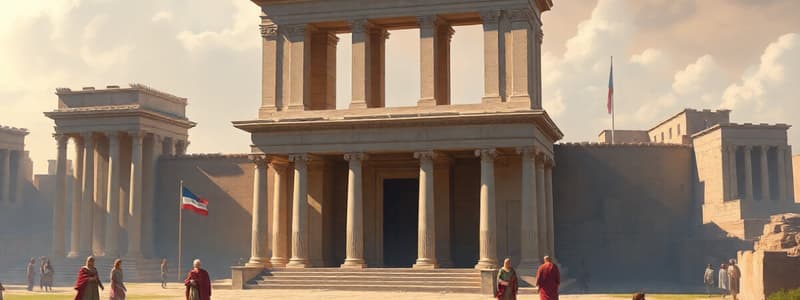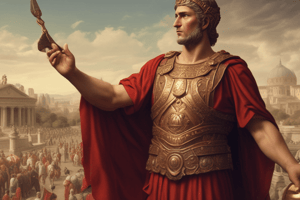Podcast
Questions and Answers
What role does the aedīlis serve within the Roman Republic?
What role does the aedīlis serve within the Roman Republic?
- Oversees the Senate
- Leads the plebeians in voting
- Judges legal cases
- Responsible for public buildings and games (correct)
Which official is known as the highest in the cursus honōrum?
Which official is known as the highest in the cursus honōrum?
- Consul (correct)
- Quaestor
- Censor
- Praetor
What is the primary function of the lēgātus in the Roman political structure?
What is the primary function of the lēgātus in the Roman political structure?
- Judicial magistrate overseeing trials
- Assistant or deputy to higher officials (correct)
- Directly elected representative of the citizens
- Leader of the equestrian class
What distinguishes optimās from other social classes in the Roman Republic?
What distinguishes optimās from other social classes in the Roman Republic?
Which assembly is known for being a voting group of about 100 individuals?
Which assembly is known for being a voting group of about 100 individuals?
Which term refers to a network of clients, often associated with patronage relationships in Roman society?
Which term refers to a network of clients, often associated with patronage relationships in Roman society?
What is the role of the praetor in the Roman Republic?
What is the role of the praetor in the Roman Republic?
What does the term plēbīscītum refer to within the framework of the Roman Republic?
What does the term plēbīscītum refer to within the framework of the Roman Republic?
What is the significance of the toga candida in Roman elections?
What is the significance of the toga candida in Roman elections?
What is the primary focus of the cēnsor in the Roman Republic?
What is the primary focus of the cēnsor in the Roman Republic?
Which official serves as a deputy or assistant in the Roman political structure?
Which official serves as a deputy or assistant in the Roman political structure?
Which social class is described as beneath the senators in Roman society?
Which social class is described as beneath the senators in Roman society?
What is the purpose of the cursus honōrum in the Roman Republic?
What is the purpose of the cursus honōrum in the Roman Republic?
What is the main role of the tribūnus in Roman politics?
What is the main role of the tribūnus in Roman politics?
Which term is most closely associated with the common citizens and the lower class in Rome?
Which term is most closely associated with the common citizens and the lower class in Rome?
What type of decree does the plēbīscītum represent in the Roman Republic?
What type of decree does the plēbīscītum represent in the Roman Republic?
What is the primary responsibility of a quaestor in the Roman governmental structure?
What is the primary responsibility of a quaestor in the Roman governmental structure?
Which official is typically considered the highest magistrate in the Roman Republic?
Which official is typically considered the highest magistrate in the Roman Republic?
Flashcards are hidden until you start studying
Study Notes
Roman Politics
- Cursus Honorum: The "course of honors," a ranked order of public offices that ambitious Romans sought to achieve.
- Quaestor: The first step on the cursus honorum, responsible for financial administration.
- Praetor: Held judicial authority, the third step on the cursus honorum.
- Consul: The highest office in the Roman Republic, the final step on the cursus honorum.
- Aedile: Official responsible for public works, games, and public order.
- Imperium: The power held by certain magistrates, such as the praetor and consul.
- Senator: Member of the Senate, the governing council of Rome, composed primarily of experienced statesmen.
- Senex: An elder, generally considered more wise and experienced than younger citizens.
- Magistrate: An elected official with specific responsibilities and powers within the Roman government.
- Censor: Responsible for conducting the census (population count) and overseeing public morals.
- Tribune: Elected official representing the Plebeians, possessing veto power over laws.
- Lex: A law, formally passed through the assembly.
- Plebiscitum: A decree passed by the Assembly of the Plebeians, which could become law.
- Clientēla: A network of clients, often tied to a patron, providing political support in exchange for patronage.
- Candidātus: A candidate for office, recognizable by his white toga.
- Suffrāgium: The right to vote, essential to the political process.
- Comitia: The assembly, where citizens gathered to make political decisions.
- Centuria: A voting group of around 100 citizens from various social classes.
- Optimates: The "best men," the aristocratic faction, composed of patricians and wealthy landowners, often favoring traditional values.
- Populares: The "popular faction," often aligned with the plebeians, advocating for the rights and interests of the common people.
- Amīcitia: Friendship, often a powerful political alliance.
- Plēbs: Common people, the lower class, comprising the majority of the Roman population.
- Equēs: The equestrian class, a social class beneath the senators, often wealthy businessmen and landowners.
Roman Government & Society
- Magistrates were elected officials with specific powers and responsibilities.
- Cursus Honorum was the ordered progression of offices held by Roman politicians.
- Quaestor was the first office held in the cursus honorum, focusing on financial administration.
- Praetor was the third office in the cursus honorum, and was a judicial magistrate
- Consul was the highest office in the cursus honorum, and two consuls were elected each year.
- Senate was Rome's governing council and was made up of senior citizens (senēs).
- Censors were responsible for conducting the census and maintaining public morals.
- Aediles were responsible for public buildings and games.
- Tribunes were officials elected by the Plebeians to protect their interests, they had veto power.
- Legate was an assistant or deputy, typically assigned to a military commander.
- Imperium was the power or authority held by certain magistrates, allowing them to command armies and exercise executive power.
Roman Society & Elections
- Plebeians were members of the lower class, making up the majority of the population.
- Plebiscites were decrees of the plebeians, which could be used to influence legislation.
- Optimātes were aristocrats and Patricians, who often held the highest offices in the government.
- Popularis were members of the populist faction, who typically championed the rights of the plebeians and opposed the optimātes.
- Senātus provided advice and guidance to the consuls, and often held considerable influence over public policy.
- Clientēla was a network of clients who supported a patron in exchange for favors and protection.
- Amicitia was a term used to describe political alliances, friendships, and loyalties.
- Candidātus is the term for anyone running for public office, the white toga (toga candida) is symbolic for a candidate seeking election.
- Suffrāgium was the vote, and was a crucial aspect of the Roman electoral system.
- Comitia centuriata was the assembly of citizens organized into centuries (voting groups of about 100).
- Centuria was a voting group of about 100 citizens and was the basis for the comitia centuriata.
- Equites were members of the equestrian class, who ranked socially below senators.
Key Terms
- Lēx: law
- Rēspublica: the Roman Republic (public government)
Studying That Suits You
Use AI to generate personalized quizzes and flashcards to suit your learning preferences.




